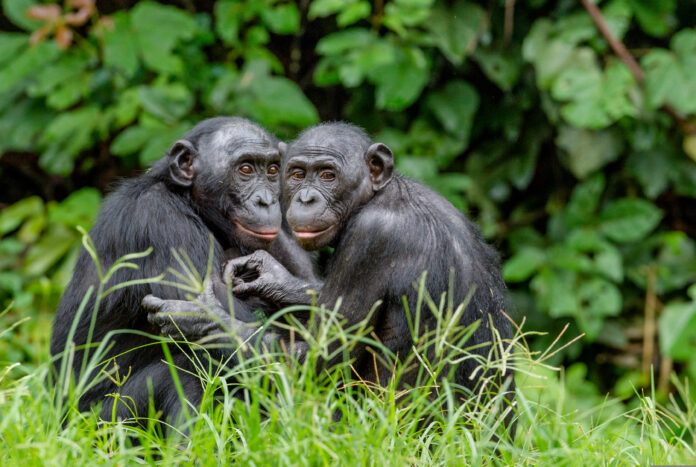Apes can recall the faces of their friends, even when they haven’t seen each other in decades, scientists have found.
A new study, which involved the longest-lasting social memory testing undergone on a species outside of humans, worked with chimpanzees and bonobos in three different zoos: Edinburgh Zoo in Scotland, Planckendael Zoo in Belgium and Kumamoto Sanctuary in Japan.
The multi-institutional group of scientists used photographs of their old companions—other apes that they had seen before—that had either left the zoo or died. The apes studied had not seen these other apes for at least nine months and, in some cases, not for 26 years. The photographs were presented to the apes side by side with pictures of total strangers.
USO/Getty
Scientists discovered that the apes were a great deal more interested in the pictures of their former friends, compared with a picture of a stranger. The findings were published in the journal Proceedings of the National Academy of Sciences.
The apes’ reactions were also measured depending on the experiences they had had with their former companions. They appeared to look at the photographs longer if they had had a positive experience with the ape presented to them.
One case took scientists by surprise the most. One ape, a bonobo named Louise, had not seen her sister or nephew for over 26 years. Over eight trials, Louise showed a clear bias toward the pictures of her sister and nephew.
This suggested that apes could be capable of social memory lasting up to or even beyond 26 years. This takes up most of their average lifespan, which is between 40 and 60 years. The research was originally inspired by the researchers’ own experience with apes and how they appeared to recognize them when they visited. From this, they hypothesized that the apes could recognize others, and it appears they were right.
“Chimpanzees and bonobos recognize individuals even though they haven’t seen them for multiple decades,” said senior author Christopher Krupenye, an assistant professor at Johns Hopkins University who studies animal cognition, in a press release.
“And then there’s this small but significant pattern of greater attention toward individuals with whom they had more positive relationships,” he continued. “It suggests that this is more than just familiarity, that they’re keeping track of aspects of the quality of these social relationships.”
Human memory and recognition begin to decline after 15 years but can carry on for as long as 48 years, previous studies have shown.
Chimpanzees and bonobos are some of humans’ closest living relatives, and similarities between the two are not uncommon. But discoveries about these similarities, and how far they go, are being made all the time.
“This pattern of social relationships shaping long-term memory in chimpanzees and bonobos is similar to what we see in humans, that our own social relationships also seem to shape our long-term memory of individuals,” said lead author Laura Lewis, a biological anthropologist and comparative psychologist at the University of California, Berkeley, in a press release.
Do the findings mean that apes miss their relatives or companions that they are no longer with?
Previously, the act of missing another individual was thought to be “uniquely human,” Lewis said.
“The idea that they do remember others and therefore they may miss these individuals is really a powerful cognitive mechanism,” she said. “Our study doesn’t determine they are doing this, but it raises questions about the possibility that they may have the ability to do so.”
People often think apes are quite different from themselves,” she said, but this research is just another example of how similar they are.
“I think that is what’s so exciting about this study,” Lewis said.
Do you have a tip on a science story that Newsweek should be covering? Do you have a question about apes? Let us know via [email protected].
Uncommon Knowledge
Newsweek is committed to challenging conventional wisdom and finding connections in the search for common ground.
Newsweek is committed to challenging conventional wisdom and finding connections in the search for common ground.


